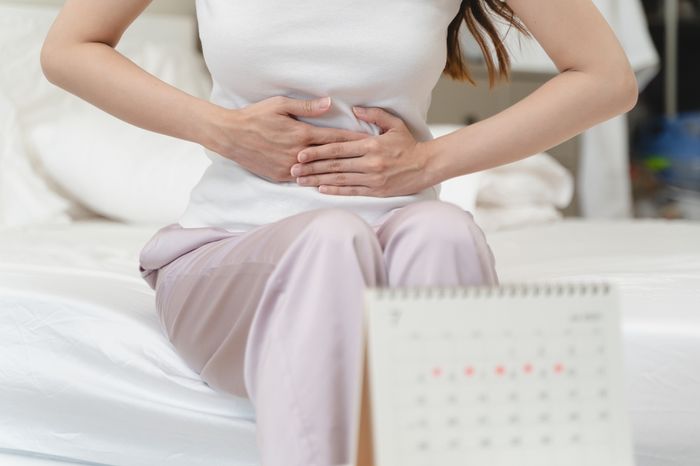Hypothyroidism & Your Menstruation Cycle: What's the Connection?
Published August 29, 2023.

Hypothyroidism is a condition where the thyroid gland, a butterfly-shaped organ located at the back of the throat, doesn't produce sufficient hormones. This is quite common, with a National Library of Medicine study showing an 11.7% prevalence in the United States. Plus, women are 5-8 times more likely to have thyroid troubles than men.
Hypothyroidism results from inadequate thyroxine production because of nutrient depletion. Low thyroxine can slow down bodily functions, like metabolism, growth, and mood regulation. It can also impact heart rate and temperature. But how does the thyroid hormone affect menstruation?
Natasha Hogan—healthcare professional, researcher, and author of Pregnancy After Infertility: A Guide to What’s Next & What’s Different—provides clarity on the connection between hypothyroidism and your menstruation cycle.
Understanding Hypothyroidism
Two main factors cause hypothyroidism:
- Iodine deficiency disorders, developmental and functional disorders caused by lowered thyroid hormones. These are prevalent because of poor soil nutrients in certain regions and affect the iodine in foods.
- Hashimoto's disease, an autoimmune disorder where the body attacks its own thyroid tissue
The likelihood of developing hypothyroidism increases with age. "Over time, our bodies wear down, and the nutrients necessary for thyroid function may deplete," explains Hogan.
Common hypothyroidism symptoms include:
- Fatigue
- Constipation
- Dry skin
- Weight gain
- Cold sensitivity
- A goiter (a visible lump in the neck) due to severe iodine deficiency
- Joint and muscle pain (specific to Hashimoto's disease)
- Mood disturbances and growth issues (particularly in children)
Influence on Thyroid Stimulating Hormone (TSH)
TSH plays a crucial role in the natural cycle, affecting the luteinizing hormone (LH), the follicle-stimulating hormone (FSH), and growth hormone levels. If there's not enough TSH, then the fluctuations necessary for a healthy period cycle may not occur, leading to reduced estrogen and less chance for an embryo to attach to the uterine wall.
- Regular TSH levels help maintain the right balance, assuring natural mechanisms function routinely.
- Increased TSH levels lead to a surge in LH, preparing the ovum and triggering an increase in basal body temperature (BBT).
- Low TSH levels mean ovulation likely won't occur, and you'll miss the chance to become pregnant. Your luteal phase, which occurs post-ovulation and before menstruation, and cycle may shorten.
Does TSH fluctuate during a menstrual cycle?
During ovulation, LH and FSH peak, but after the 16th day, TSH and related hormones should start to reduce, and the BBT will remain elevated. This temperature level, partly indicative of TSH levels, will stay up if you are pregnant, have inflammation, or have an infection. And after ovulation, there's more progesterone, which helps keep the temperature warm during the luteal phase.
Hypothyroidism and Menstrual Cycles: In-Depth
Hypothyroidism symptoms in females often relate to menstrual cycle disruptions. The pituitary gland and hypothalamic-pituitary-thyroid (HPT) axis both play vital roles in facilitating hormone production.
It can contribute to conditions like polycystic ovary syndrome (PCOS), leading to higher testosterone levels in women. Interfered sex hormones, including estrogen, FSH, and DHT (an androgen) can lead to ovarian pathology in women, such as anovulation and cysts.
Impact on Periods
Irregular periods—caused by low progesterone levels—can shorten various parts of the menstrual cycle, including the luteal phase. This irregularity in conjunction with hypothyroidism can manifest the following:
- Missing periods (periods may only occur every six months or even longer)
- Extended heavy periods at the start of a cycle, which can cause fatigue and iron and zinc deficiencies
- More frequent menstruation, like periods every 2 weeks
- Ovulation between day 16 and 21 of the cycle instead of the usual days 12 to 16, impacting the ability to conceive
- Identifying ovulation with BBT tracking for peak conception times can be challenging
Effect of Thyroid Hormone on Menstruation
A 28-day cycle is desirable, but understanding what's happening in the cycle is crucial, especially when thyroid issues are present. In this case, tracking BBT results may not provide an accurate view of hormonal imbalances when the hormones are not functioning in their correct pattern to start with. Your doctor can help check this and might administer regular blood tests. And hormone tracking tests should be done at the same time daily to ensure the most reliable results.
Hypothyroidism in young people, in particular, may go unnoticed, especially if it's subclinical without other symptoms. This lack of diagnosis can be dangerous, as low thyroid levels during pregnancy can lead to complications. Therefore, it's wise to consult a fertility specialist who will ensure that TSH and other vital factors are adequately managed, supporting healthy reproductive health.
» Find out how tracking BBT may reveal undiagnosed hypothyroidism
Treatment Options for Hypothyroidism
Interestingly, hypothyroidism is also the symptom of a root cause which is inflammation, especially if you are fully diagnosed with Hashimoto's disease. It's not just the lack of thyroid hormones or nutrition to make T cells, but also an irritation of your body's systems that makes the thyroid hormones.
So, managing this condition can help alleviate symptoms that affect your menstrual cycle and overall reproductive well-being. However, all changes or treatment adjustments should be made under the advisement of healthcare providers.
Dietary Modifications and Supplementation
Increasing the intake of nutrients like iodine and selenium may improve hormone secretion and alleviate symptoms, such as poor sleep cycles caused by nutrient deficiencies and hormone imbalances.
Some food sources and nutrients to help manage thyroid health include:
- Kelp, which contains high iodine content
- Iodized salt
- Micronutrients, like selenium, in organ meats and Brazilian nuts
- Zinc in oysters, meats, poultry, and legumes
- Dark chocolate, pumpkin seeds, and leafy greens for magnesium, which helps with iodine absorption
- Omega-3 fatty acids found in sardines, salmon, and chia seeds
Hogan advises, "Remember that while it's crucial to ensure adequate nutrient intake, excessive supplementation combined with high-nutrient foods might tip the balance too far, leading to other health issues."
Hormone Replacement Therapy
For those with severe hypothyroidism, a synthetic thyroid hormone (levothyroxine) can be administered. This therapy can help regulate the body's hormone levels and may address irregular periods caused by thyroid issues, which can improve the chances of conception.
Hogan explains how this therapy can affect your cycle here:
"The body, when deficient in nutrients, might hold onto them in a sort of 'starvation state,' delaying the process of normalization."
Thyroid Medication
So how does thyroid medication affect the menstrual cycle? "The beautiful part of receiving thyroid medication for hypothyroidism is the potential normalization of your cycle," says Hogan. This treatment can restore the more common 28-day cycle, assuming that's your individual pattern.
However, always keep an eye on any side effects you may experience. For example:
- If your cycle becomes shorter than the standard 28 days and you experience more frequent or potentially heavier bleeding, it could be a sign that the medication is overstimulating you, making your hyperthyroidism symptoms more frequent and pregnancy more difficult to achieve due to shorter cycles.
- If the medication isn't working sufficiently, the cycles may expand, leading to longer times between periods, which can result in heavier cycles.
Note: The catch-22 is that utilizing medication or a synthetic hormone can improve your cycle but doesn’t necessarily reduce inflammation. So, while it isn't a cure, it can alleviate symptoms.
Mental Health Support
While the aforementioned interventions can address the physical symptoms of hypothyroidism, there are emotional and psychological impacts to consider, particularly for women who have experienced infertility. Hypothyroidism impacts mood due to its role in metabolism regulation, which can lead to increased anxiety and mood swings.
"Proactive management of hypothyroidism is critical for both maternal and fetal health, especially for those with a history of infertility," says Hogan.
» Learn how to recognize healthy hormones by charting
Help Keep Your Cycle In Check
While hypothyroidism cannot be prevented, it can be managed effectively, especially among individuals at higher risk due to a history of autoimmune diseases, radiation therapy in the neck or head, goiters, or a family history of thyroid issues. Early detection can help prevent the disease from progressing and help minimize the impact it has on your menstruation.
Leveraging tools like Tempdrop's fertility tracker—an easy-to-use way of monitoring BBT—and consulting with your doctors regularly about treatment specifics can help restore some balance and stability to your cycle. Hypothyroidism doesn't have to make your periods a nightmare.





